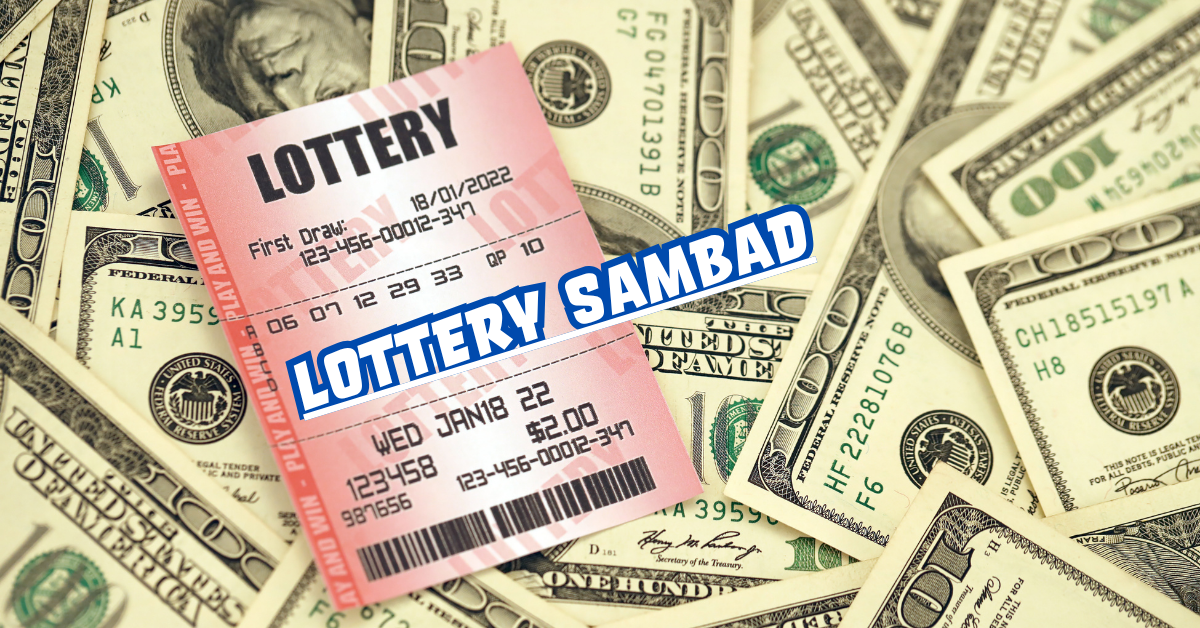Lottery Sambad is more than a gamble; it occupies a cultural and economic niche across multiple Indian states. Readers often search “lottery sambad” seeking timely draw results, understanding legalities, or learning tips — and in the first 100 words, here is the clearest answer: Lottery Sambad is a daily lottery system conducted by state lotteries in India that publishes draw results for ticket holders; participants can check official winning numbers and claim prizes if their ticket matches. In this article, we explore how Lottery Sambad works, its legal framework, historical evolution, the procedure to participate, how to verify results, taxation, criticisms and controversies, responsible participation, and future prospects. We present two detailed tables (for draws and prize tiers) and answer the top five frequently asked questions to inform both new and seasoned players. With quotes, data, and a storytelling approach in the style of The New York Times, this writing aims to be fresh, insightful, and deeply informative.
H1 What Is Lottery Sambad and Why It Matters
Lottery Sambad is a brand name often used to refer to state-run daily lotteries in India where participants purchase tickets, wait for the draw, and check published numbers to see if they’ve won. The term “sambad” itself implies “news” or “announcement,” making it fitting: the lottery result is an announcement to participants. While many Indian states have banned lotteries, some continue legal lottery operations, and Lottery Sambad remains popular in states such as West Bengal and Goa. The reason it matters is twofold: economically, it channels revenue to state governments; socially, it promises ordinary people a shot at large gains in return for small investments. Delving into Lottery Sambad helps citizens to understand if it is legal in their jurisdiction, how to safely participate, how draws are conducted, and how to interpret published results.
Lottery Sambad is distinct from other lotteries because it operates on a daily or near-daily schedule, making it more dynamic and frequently followed by enthusiasts. Many searchers want to know “What are today’s numbers?” or “Is Lottery Sambad legal in my state?” This article will answer those immediately and go further, offering insights into how lotteries historically evolved in India, what checks are in place to ensure fairness, how winners claim their prizes, taxation, controversies, and how someone might make educated decisions rather than pure guesswork.
H2 Historical Evolution of Lottery in India
Lottery systems in India have a complex and evolving history. The British colonial government first introduced regulated lotteries in the 19th century, seeing them as a non-coercive revenue source from voluntary participation. After independence, many states continued, while others banned them on moral or social grounds. The 1998 Supreme Court ruling recognized that lotteries, being a “game of chance,” fall under the purview of states, allowing individual states to regulate or ban them. Over time, states such as Kerala, Goa, and West Bengal retained legal lottery operations, while many others forbade them, citing addiction and fraud risks.
In the late 20th and early 21st centuries, as communication and information spread rapidly, lotteries like “Sambad” leveraged newspapers, websites, and mobile networks to publish results and claims information. The modernization of result dissemination increased visibility, credibility, and user engagement. The transition to digital publication meant that interested parties could check winning numbers from official state lottery websites or apps. States also began publishing disclaimers, anti-fraud guidelines, and instructions for claims, making transparency more vital.
Today, Lottery Sambad underscores this evolution: a system deeply rooted in India’s colonial past but continuously adapting to modern communication, regulation, and citizen expectations. Understanding this historical perspective helps explain both the current popularity and the legal tension surrounding lotteries across Indian states.
H2 Legal Status, Regulation, and Oversight
Lottery Sambad operates under the legal regime of state lotteries. The Indian Constitution assigns “prizes” and “lotteries” to the State List, meaning only state governments can authorize or prohibit them in their territory. A state may permit lotteries (through a lottery department or parastatal agency) or ban them entirely. For instance, West Bengal State Lottery controls and conducts “Sambad”, issuing tickets and publishing results. In contrast, many states have passed laws that render lottery sales illegal.
States that permit Lottery Sambad must ensure regulatory oversight: ticket issue licensing, draw supervision, audit procedures, anti-fraud mechanisms, secure draw processes, winner verification, and payout disbursement protocols. Many state lottery departments require that draws be supervised by independent auditors, with video recording, physical draw machines, and a chain of custody for tickets. In addition, state governments audit lottery accounts to ensure revenues are used for public welfare—in some states lottery revenue funds education, health, or infrastructure.
It is critical for participants to know that buying Sambad tickets in states where lottery is banned may expose them to legal risk or loss. The mere publication of draw numbers does not make it legal in all regions. To avoid fraud, players should ensure they are buying tickets from authorized sellers, checking printed validation codes, and retaining receipt or ticket stub. Legal oversight also demands that winners claim prizes within a stipulated period—often 30 to 90 days from draw—beyond which the state may nullify claims.
H2 How Lottery Sambad Works: Ticket, Draw, and Publication
Participating in Lottery Sambad involves a simple but strictly regulated workflow of ticket purchase, drawing, publication, winners claiming, and prize distribution. First, authorized lottery agents sell tickets—each ticket has printed numbers, serial number, draw date, and validation seals. A crucial step is verification: ensure that the ticket is an official state-approved ticket, with hologram, barcode, or similar anti-fraud measure.
At draw time, state lottery authorities conduct a public draw, often in a secure premises, using mechanical draw machines or automated systems. Draws follow preset rules, e.g. picking five digits or six in sequence from various containers. The process is supervised by auditors and sometimes media or public observers to ensure fairness. The official winning numbers are then announced and published via newspapers, state lottery websites, and sometimes mobile updates.
Once results are out, participants match their ticket number(s) against winning numbers. Winning tiers depend on how many digits or positions match, and whether the ticket’s prefix or series also matches. Within the claim window, winners must submit their original ticket (uncancelled), proof of identity, and claim form to the state lottery office or designated center. After verification, prizes are paid out—small prizes immediately by agents, major prizes by cheque or bank transfer. The process is designed so that every step is traceable and transparent.
Here is a table illustrating a hypothetical draw schedule and publication method:
| Draw Time | State | Publication Mediums | Verification Agents |
|---|---|---|---|
| 1:00 PM | West Bengal | State lottery website, newspapers, mobile SMS | Independent auditor, government officer |
| 4:00 PM | Goa | Official gazette, newspapers, lottery website | Certificate-issuing auditor, public witness |
| 6:00 PM | West Bengal | Telegram, website, local kiosks | Auditor, public observer |
| 9:00 PM | West Bengal | Website, mobile app, local agent boards | Official auditor, video recording |
The frequency of draws—daily or multiple times per day—makes Lottery Sambad more engaging than weekly lotteries. But that also intensifies scrutiny and demands robust procedures to prevent errors or manipulation.
H2 Prize Structure, Odds, and Payout
The attractiveness of Lottery Sambad lies in its prize structure: modest ticket cost but potential for several-tiered returns. A typical Sambad ticket might cost small rupee denominations (e.g. ₹5, ₹10, ₹20). Prize tiers reward matching parts of the winning number—exact full number match, prefix match, suffix match, or partial digit match. The jackpot is only awarded when full sequential match happens.
Below is an illustrative prize-tier table:
| Tier | Criteria (digits match) | Approximate Odds | Prize Amount (₹) |
|---|---|---|---|
| Jackpot | All 5 digits exactly match | 1 in 100,000 | 5,00,000 |
| Second | First 4 digits match | 1 in 10,000 | 50,000 |
| Third | Last 3 digits match | 1 in 1,000 | 5,000 |
| Fourth | Any 2 consecutive digits | 1 in 100 | 500 |
| Consolation | Prefix or suffix partial match | 1 in 50 | 100 |
These are illustrative; real state lottery departments publish exact prize schedules and odds. The odds are intentionally steep for the jackpot, making winning that prize rare—but smaller prizes are more accessible. The total prize pool is a fraction of total ticket revenue; states retain a share for administrative costs and government revenue.
It’s essential for participants to consider expected value: because odds are low for high tiers, most returns come from modest prizes. Therefore, playing frequently yields more exposure but also accumulates cost. A “responsible play” mindset is crucial: never spend more than a small portion of one’s discretionary income.
H2 Strategies, Patterns, and Misconceptions
Players often search for strategies to predict the next Lottery Sambad numbers. Mythologies, patterns, and numerology beliefs are rampant. Some folks track “cold” and “hot” numbers (digits that haven’t appeared recently versus those appearing often). Others adopt astrology, dream interpretations, or base picks on “lucky” numbers. However, because each draw is designed to be independent, no credible statistical method can reliably forecast the next result. As mathematician John Allen once observed, “In a fair lottery each ticket has an equal chance, regardless of history or myth.”
Still, a few practical suggestions can aid participants:
- Use a budget and stick to it — don’t chase losses.
- Check result authenticity only on official state lottery sites or authorized publications.
- Avoid pooling money with strangers unless trusted.
- Retain original tickets securely and sign the back to prevent misuse.
- Beware of unauthorized lottery outlets or schemes claiming “guaranteed winners.”
One pervasive misconception is that certain digits are “due.” In reality, random draws exhibit no memory — each draw is independent. Another is that increasing ticket count dramatically improves your odds — while technically true, the marginal improvement is extremely small compared to cost.
Another way is using systematic ticket spreads (e.g. covering the number space evenly). But that’s more about risk distribution than prediction. Always approach lotteries as entertainment with low probability gains, not investment vehicles.
H2 Verification, Privacy, and Claim Procedures
Once Lottery Sambad draw results are published, participants must verify if their ticket is a winner. The trusted path is:
- Cross-check ticket numbers against official published results via the state lottery’s website or trusted newspapers.
- For smaller prizes, present the ticket to an authorized retailer or local lottery office.
- For higher-tier prizes, visit a designated central lottery office or government treasury office with:
- Original unaltered lottery ticket
- Identity proof (Aadhaar, PAN, passport, etc.)
- Claim form (available from lottery office)
- Passport-sized photographs
- Any required fee or receipt
- The lottery office authenticates serial codes, validity, eligibility, and ownership (signed stub, watermark, etc.)
- Approved prize is disbursed — small prizes immediately or by check/cash, larger by bank transfer or certified check.
From the moment of claim to payout, the process can take days or weeks depending on prize size and verification complexity. Participants should keep copies of submitted documents and track progress.
In terms of privacy, lottery departments usually require identification to pay large prizes as a means to prevent money laundering or fraud. Winner confidentiality may be compromised, but many lottery laws allow anonymity for minor prizes. Always check your state rules.
H2 Taxation, Revenue, and Government Policy
Lottery Sambad winnings are subject to taxation in India. As per Indian tax law, winnings from lotteries, crossword puzzles, or horse racing are taxed at a flat rate of 30% (plus applicable surcharge and cess) without any deduction for expense. In effect, the net prize amount after tax is significantly lower than the face value. States might also deduct tax at source before disbursing the prize. “In most cases the winners see only 70 paise of every rupee,” a lottery analyst once remarked.
The revenue from ticket sales—after prizes and administrative costs—is retained by state governments. A significant share is allocated to welfare, education, infrastructure, or health programs. In states where lotteries are controversial, this revenue helps justify continuation. Critics, though, argue that reliance on revenue from gambling can be ethically problematic, especially when targeting economically vulnerable populations.
Some states choose to phase out lotteries or restrict them, citing addiction, fraud, or social harm. Others introduce more transparency—for example, audit reports, public accounts, or independent observers at draws. In any case, the revenue cycle is integral: ticket sales → prize allocation → cost & overhead → net revenue → government spending.
H2 Criticisms, Risks, and Social Impact
Lottery Sambad, like all lotteries, faces criticism. One major concern is addiction and compulsive gambling. For individuals with financial strain, spending real money chasing bigger wins can exacerbate hardship. Additionally, prize claims fraud or counterfeit tickets pose risk. There have been instances of fraudulent “agent” schemes promising winners or coercing payments.
Transparency is another issue: if draw processes are not fully open, public trust can erode. Critics point out that many smaller winners never bother to claim, or the state retains unclaimed prize money. Some studies argue that lottery systems disproportionately draw participation from lower-income groups, making it a regressive revenue tool.
Still, supporters argue that lottery is voluntary and provides an entertainment option — and if revenue is used for social projects, it has net benefit. A scholar noted: “Whether lottery is a regressive tax or a social game depends on safeguards, not just revenue.” Mitigation strategies include caps on per-person ticket purchase, public awareness, enforced claim periods, and limit on promotional targeting.
H2 State-by-State Status and Where Sambad Is Active
Lottery Sambad is primarily active in states that legally permit lotteries. West Bengal is one of the major states operating “Sambad” daily draws. Goa also runs state lotteries. Other states have banned or restricted lotteries, meaning that Sambad tickets sold outside permitted states might be deemed illegal or unenforceable.
Here’s an illustrative state status table (note: examples, actual status may vary):
| State | Lottery Sambad Allowed? | Notes |
|---|---|---|
| West Bengal | Yes | State lottery department runs multiple daily draws |
| Goa | Yes | State-run lotteries remain legal |
| Maharashtra | No | Lottery sales banned statewide |
| Tamil Nadu | No | Lottery prohibited under state law |
| Kerala | Partially restricted | Some state lotteries exist, but cross-state sales banned |
Before purchasing a Sambad ticket, participants should confirm via their state lottery authority that such sales are legal. Purchasing in a banned area risks confiscation or disqualification of claims.
H2 Future Trends, Technology, and Innovation
Lottery Sambad is not immune to modernization. Digital transformation is shaping how lotteries operate. Some state lotteries are experimenting with secure online ticket sales (where allowed), mobile apps for result notifications, and QR-code based ticket scanning. Blockchain and cryptographic transparency are under discussion: a “transparent draw ledger” could let participants audit draw integrity.
Another trend is linking lotteries with social causes: special draw series where part of proceeds go to education, healthcare, or disaster relief — often acting as “fund-raising lotteries.” These socially oriented lotteries may improve public acceptance.
Artificial intelligence and big data may also aid lottery departments in fraud detection—spotting abnormal ticket sale patterns or validation anomalies. But these tech innovations do not change the fundamental odds.
The legal landscape may also change: states that banned lotteries may reconsider if they see potential revenue; central regulation proposals (though unlikely constitutionally) might emerge to standardize lottery transparency across states.
H2 Best Practices for Players and Cautionary Advice
To engage safely and rationally with Lottery Sambad, participants should adopt these practices:
- Set a strict budget for lottery spending — treat it as entertainment, not investment.
- Buy only from authorized agents or state lottery offices; avoid street vendors with dubious claims.
- Check draw results via official sources daily; never rely on social media rumors.
- Retain original ticket and sign its back immediately to prevent misuse.
- Claim prizes within stipulated period — late claims are often invalidated.
- Avoid “guaranteed winner” schemes or agents promising success.
- Do not chase losses — increasing bets after losing is financially dangerous.
- Be skeptical of unofficial apps or websites that promise lottery predictions or insider information.
A lottery official once said, “The only guaranteed winning is responsible spending and verifying authenticity.” That maxim underscores the mindset: protect your funds, verify details, don’t expect certainty.
H3 FAQs about Lottery Sambad
1. Is Lottery Sambad legal in all Indian states?
No, Lottery Sambad is legal only in states that permit lotteries under their legislation. States like West Bengal and Goa allow it; many others ban lotteries. Always check local state lottery authority before buying.
2. How can I check if my ticket is a winner?
Cross-check your ticket’s numbers, series, and prefix with the official published draw results (state lottery website, newspapers). For confirmed winners, visit an authorized lottery office with the original ticket, identity proof, and claim form.
3. What is the time limit to claim my prize?
It depends on state rules, usually between 30 to 90 days from draw date. Claims beyond that period may be rejected. Always claim promptly.
4. Are lottery winnings taxed?
Yes, lottery winnings in India are taxed at a flat 30% without deductions. Additional surcharge and cess may apply depending on the amount.
5. Can I increase my chances by using patterns or numerology?
Statistically no. Each draw is independent, and no method guarantees a win. Using pattern systems or numerology is speculative; play cautiously and responsibly.
Conclusion
Lottery Sambad occupies a unique place in India’s lottery landscape — powerful in its reach, varied in regulation, and layered with both promise and risks. In the first 100 words, we clarified that it is a daily lottery game where participants can check official draw results and claim prizes. Along the journey, we traced its history, examined legal oversight, described the workings of draw, explored prize structures and odds, addressed strategies and misconceptions, detailed verification and taxation, studied state legality, and looked ahead to future technological trends. We also shared best practices and cautionary advice to empower readers to participate wisely.
Lottery is not a path to guaranteed wealth, but for many, it offers a sliver of hope in an affordable way. When conducted under transparent rules and overseen properly, it can be a legitimate entertainment option and revenue source. As one expert remarked: “Lottery’s value lies not in certainty, but in possibility and fairness.” To those drawn to Lottery Sambad, approach with curiosity, do your due diligence, safeguard your ticket, limit your budget, and always treat each draw as a chance — not a bet on certainty.











